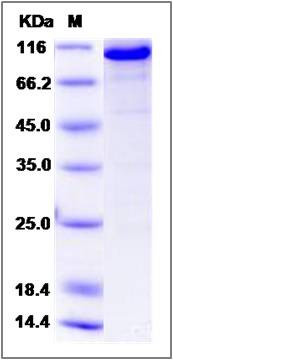Human CASK Kinase Protein
CAGH39,CAMGUK,CMG,FGS4,LIN2,MICPCH,MRXSNA,TNRC8
- 100ug (NPP3638) Please inquiry
| Catalog Number | P11913-HNCB |
|---|---|
| Organism Species | Human |
| Host | Baculovirus-Insect Cells |
| Synonyms | CAGH39,CAMGUK,CMG,FGS4,LIN2,MICPCH,MRXSNA,TNRC8 |
| Molecular Weight | The secreted recombinant human CASK consists of 899 amino acids and predicts a molecular mass of 102.1 KDa. The apparent molecular mass of the protein is approximately 102 KDa in SDS-PAGE under reducing conditions due to glycosylation. |
| predicted N | Gly |
| SDS-PAGE |  |
| Purity | > 90 % as determined by SDS-PAGE |
| Protein Construction | A DNA sequence encoding the human CASK (O14936-4) (Ala 2-Tyr 898) was expressed and purified with two additional amino acids (Gly & Pro) at the N-terminus. |
| Bio-activity | Kinase activity untested |
| Research Area | Cancer |Signal transduction |Signaling Pathway |Calcium Signaling |Calmodulin Pathway |
| Formulation | Lyophilized from sterile 20mM Tris, 500mM NaCl, 10% glycerol, pH 7.4. 1. Normally 5 % - 8 % trehalose and mannitol are added as protectants before lyophilization. Specific concentrations are included in the hardcopy of COA. |
| Background | Peripheral plasma membrane protein CASK, also known as calcium/calmodulin-dependent serine protein kinase, CASK and LIN2, is a nucleus, cytoplasm and cell membrane protein which belongs to the MAGUK family. CASK / LIN2 contains one guanylate kinase-like domain, two L27 domains, one PDZ (DHR) domain, one protein kinase domain and one SH3 domain. CASK / LIN2 is ubiquitously expressed. Expression of CASK / LIN2 is significantly greater in brain relative to kidney, lung, and liver and in fetal brain and kidney relative to lung and liver. CASK / LIN2 is a multidomain scaffolding protein with a role in synaptic transmembrane protein anchoring and ion channel trafficking. CASK / LIN2 contributes to neural development and regulation of gene expression via interaction with the transcription factor TRB1. It binds to cell-surface proteins, including amyloid precursor protein, neurexins and syndecans. CASK / LIN2 may mediate a link between the extracellular matrix and the actin cytoskeleton via its interaction with syndecan and with the actin/spectrin-binding protein 4.1. Defects in CASK are the cause of mental retardation X-linked CASK-related (MRXCASK). Mental retardation is characterized by significantly below average general intellectual functioning associated with impairments in adaptative behavior and manifested during the developmental period. Defects in CASK are also the cause of FG syndrome type 4 which is an X-linked disorder characterized by mental retardation, relative macrocephaly, hypotonia and constipation. |
| Reference |
